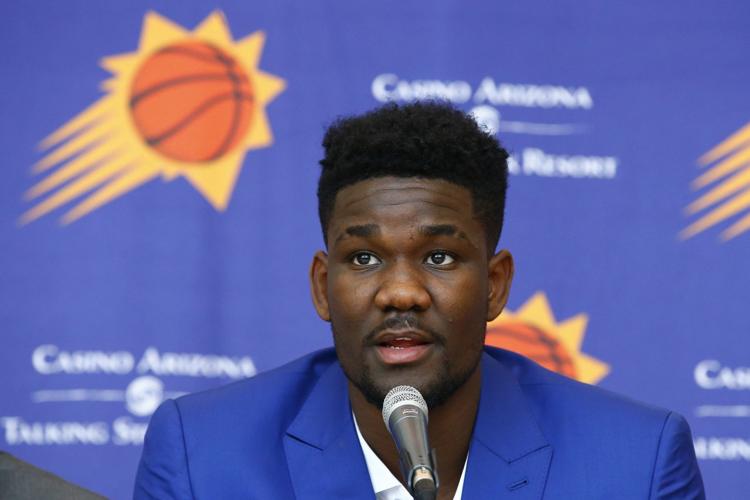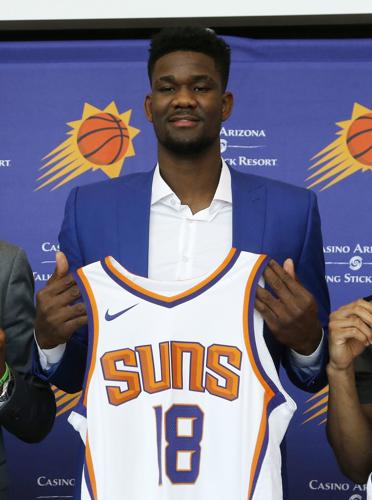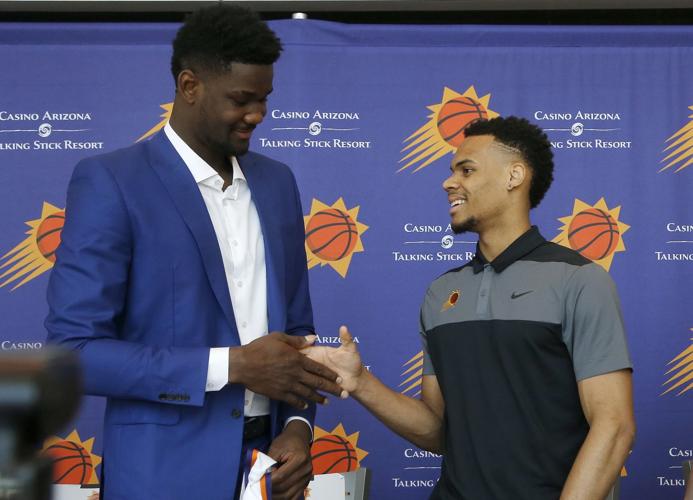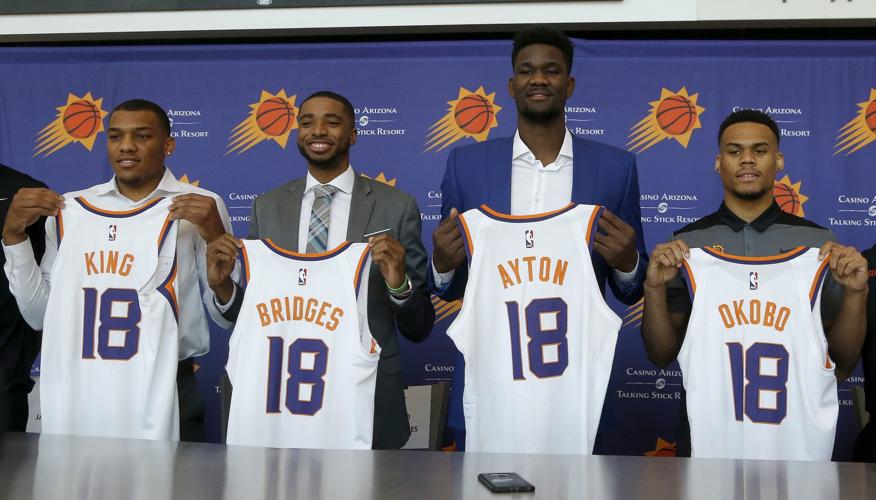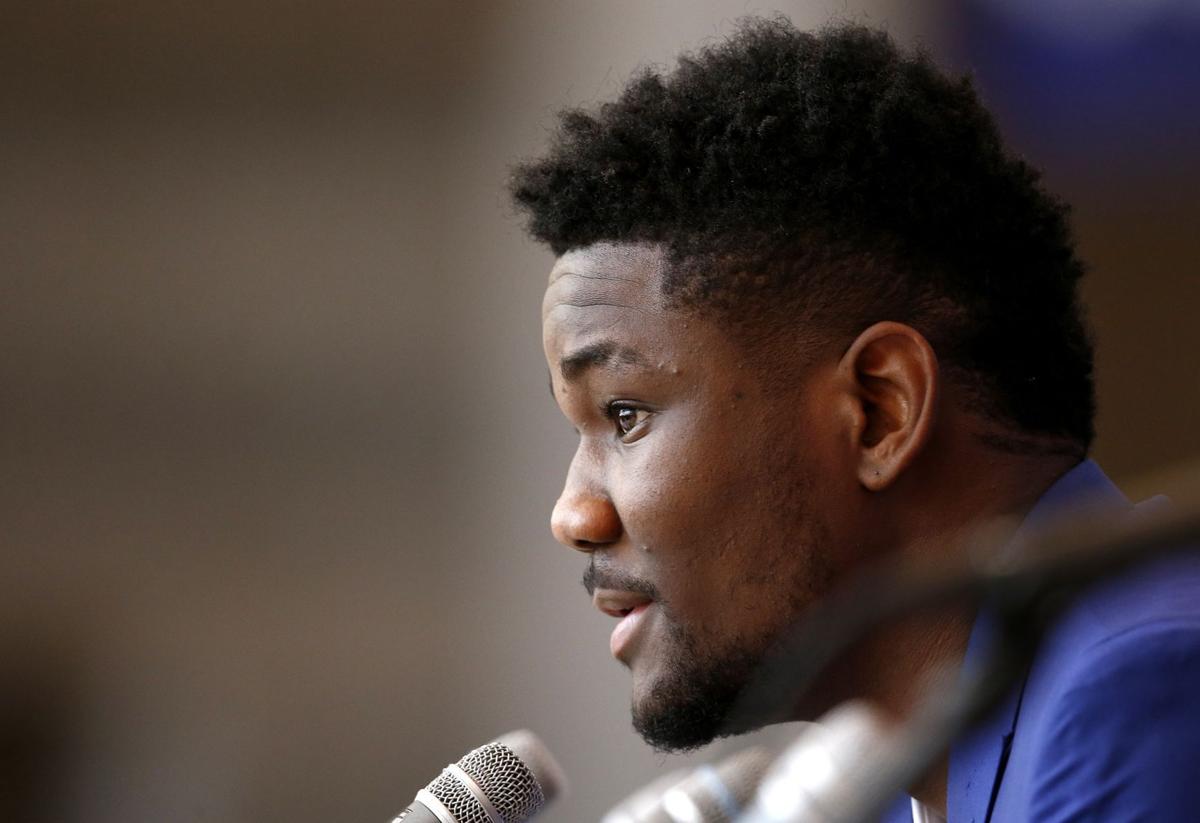PHOENIX — When Deandre Ayton and his family were basking in the final moments of the prospect’s amateur basketball career, the former Arizona Wildcat shared a special moment with his college coach, Sean Miller.
The Phoenix Suns were on the clock with the No. 1 pick and Ayton was confident that NBA commissioner Adam Silver would call his name. Ayton murmured to Miller that the Suns hat awaiting the top pick belonged to only one player.
“I looked at him and told him that’s my hat size. Nobody can go up there and try that hat on, because it’s my hat size,” Ayton said. “He laughed and chuckled a little bit and he gave me a hug and told me that he loved me and I told him that I love him.”
Silver walked back out on stage to announce the No. 1 pick. Then the words came out of Silver’s mouth: “With the first pick in the 2018 NBA Draft, the Phoenix Suns select Deandre Ayton.”
“As soon as he called my name, I was like, ‘Yo, he just called my name.’ He didn’t take a breath, just ‘Deandre Ayton.’ What? As soon as I got up on the podium, I shook his hand and I was like, ‘This is really happening.’ When he touched my hand, that’s when I knew it was real.”

Former Arizona Wildcat and No. 1 draft pick Deandre Ayton answers a question during a news conference Friday.
During Friday’s introductory press conference in Phoenix, Ayton described his draft week as a “dream come true” and was eager to begin a new legacy with a franchise that hasn’t appeared in the postseason in eight years.
Ayton now enters a situation he’s unfamiliar with. At UA, he showcased his on-court talent and off-court personality, and was a leader by example. Not only will Ayton have to live up the expectations of being a No. 1 pick, but he’ll have to lead the Suns with his words. That might not be so easy for a 19-year-old.
“The competitiveness and leadership that he brings is huge,” said first-year Suns head coach Igor Kokoskov. “We’re going to encourage him to be the voice of this team.”

Phoenix Suns’ Deandre Ayton poses for a photo as the team introduces their top pick after the NBA basketball draft Friday, June 22, 2018, in Phoenix.
The voice? That’s still a work in progress. The production? That remains to be seen at the NBA level, but out of all of Phoenix’s draft picks, no one is more familiar with Ayton than former Colorado guard and 59th overall pick George King.
King played Arizona three times in 2018, and frequently defended Ayton.
“He’s a physical specimen, freak athlete, great work ethic and is a do-it-all guy. He’s going to have a long, prosperous NBA career,” King said. “You don’t gotta highlight what’s already bolded, especially at the collegiate level. No. 1 pick playing in college, all you can do is try your best to defend him. It’s hard to stop him.”
Ayton brings exactly what the Suns are seeking: a center that can space the floor and beat opponents in multiple ways. His skillset resembles a Swiss Army knife, and Kokoskov plans to coach Ayton to get the best out of him. That may be a matter of simply allowing Ayton to do what Ayton does.
“We’re going to play to his strengths,” Kokoskov said. “He’s no different than any other young player coming into this league.
“He’s got a lot of potential with his size, length, ability as a rim protector, ability to protect the paint, so we’re going to go step-by-step with him.”

Phoenix Suns’ Deandre Ayton, left, and Elie Okobo, right, of France, slap hands after the team introduced its new players after the NBA basketball draft Friday, June 22, 2018, in Phoenix.
Ayton’s strengths include playing in the post with his back to the basket, having the ability to face up defenders and either utilize his soft footwork to get to the rim or pop off a jump shot. At 7-foot-1, 260 pounds, players like Ayton don’t come around often, and he fits like a glove with the Suns young core of Devin Booker and Josh Jackson.
Booker was 12th in the league a season ago in 3-pointers made, while Jackson is an athletic two-way player that can lock down opponents, particularly on the wing. Phoenix had a 102.64 pace rating last season, which was second in the NBA. It was last in offensive efficiency.
The Suns were one of the fastest teams in the league, but they struggled to score.
The Suns also struggled to rebound. Phoenix finished No. 23 in the NBA in total rebounds, but No. 14 in offensive rebounding thanks to Alex Len’s 2.5 offensive boards per game.
But Len is an unrestricted free agent this summer so his future in Phoenix is still a mystery. That leaves the frontcourt with Tyson Chandler, Marquese Chriss and Dragan Bender. Chriss and Bender are stretch power forwards, both under 21 years old, while Chandler is on the back nine of his career at 35.

From left to right, Phoenix Suns’ George King, Mikal Bridges, Deandre Ayton and Elie Okobo pose for a photo as the team introduces their new players after the NBA basketball draft Friday, June 22, 2018, in Phoenix.
At UA, Ayton scarcely played center except for when 7-footer Dusan Ristic was on the bench. It didn’t stop Ayton from averaging a double-double in his lone season, but playing as a power forward for much of his collegiate career with another 7-foot player beside him taught Ayton how to create space as a versatile forward.
“Playing with Dusan at Arizona, I really got the feel for that. Now that I’m playing down low, it’s just a whole new ball game and I’m even more of a threat,” Ayton said. “I can score down low and can score on the outside. There’s a lot of versatility with the big men on this team.”
Kokoskov knows the versatility of his frontcourt and believes Ayton will thrive once he adjusts to the NBA.
“The aspects of the NBA game will be easier because of his ability to play around the basket and being a very mobile athlete,” Kokoskov said. “I think the transition between college basketball and NBA, just from this perspective, will be easy for him.”
Ayton carried high expectations when he entered his freshman year at Arizona as the top recruit in the country. He exceeded those expectations.
Now, he gets another golden opportunity playing for a team that is minutes away from his high school and two hours up the road from his college.
While Ayton gets the week off after a hectic week preparing for the draft, he is eager to finally make his mark as one of the best centers in a golden era of versatile big men.
“Playing in high school, I didn’t really think that I would be in the NBA that much, but now that I’m here, I’m ready,” Ayton said. “I’m ready to get used to it and I’m just ready to start a new legacy here.”


